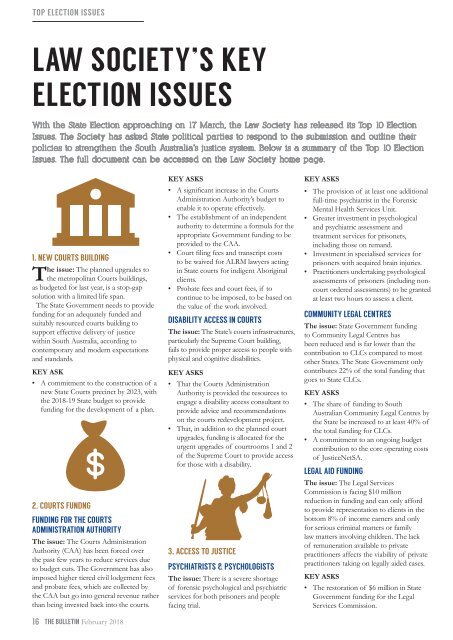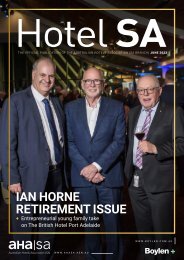LSB February 2018_Web_LSSA
Create successful ePaper yourself
Turn your PDF publications into a flip-book with our unique Google optimized e-Paper software.
TOP ELECTION ISSUES<br />
LAW SOCIETY’S KEY<br />
ELECTION ISSUES<br />
With the State Election approaching on 17 March, the Law Society has released its Top 10 Election<br />
Issues. The Society has asked State political parties to respond to the submission and outline their<br />
policies to strengthen the South Australia’s justice system. Below is a summary of the Top 10 Election<br />
Issues. The full document can be accessed on the Law Society home page.<br />
1. NEW COURTS BUILDING<br />
The issue: The planned upgrades to<br />
the metropolitan Courts buildings,<br />
as budgeted for last year, is a stop-gap<br />
solution with a limited life span.<br />
The State Government needs to provide<br />
funding for an adequately funded and<br />
suitably resourced courts building to<br />
support effective delivery of justice<br />
within South Australia, according to<br />
contemporary and modern expectations<br />
and standards.<br />
KEY ASK<br />
• A commitment to the construction of a<br />
new State Courts precinct by 2023, with<br />
the <strong>2018</strong>-19 State budget to provide<br />
funding for the development of a plan.<br />
2. COURTS FUNDNG<br />
FUNDING FOR THE COURTS<br />
ADMINISTRATION AUTHORITY<br />
The issue: The Courts Administration<br />
Authority (CAA) has been forced over<br />
the past few years to reduce services due<br />
to budget cuts. The Government has also<br />
imposed higher tiered civil lodgement fees<br />
and probate fees, which are collected by<br />
the CAA but go into general revenue rather<br />
than being invested back into the courts.<br />
KEY ASKS<br />
• A significant increase in the Courts<br />
Administration Authority’s budget to<br />
enable it to operate effectively.<br />
• The establishment of an independent<br />
authority to determine a formula for the<br />
appropriate Government funding to be<br />
provided to the CAA.<br />
• Court filing fees and transcript costs<br />
to be waived for ALRM lawyers acting<br />
in State courts for indigent Aboriginal<br />
clients.<br />
• Probate fees and court fees, if to<br />
continue to be imposed, to be based on<br />
the value of the work involved.<br />
DISABILITY ACCESS IN COURTS<br />
The issue: The State’s courts infrastructures,<br />
particularly the Supreme Court building,<br />
fails to provide proper access to people with<br />
physical and cognitive disabilities.<br />
KEY ASKS<br />
• That the Courts Administration<br />
Authority is provided the resources to<br />
engage a disability access consultant to<br />
provide advice and recommendations<br />
on the courts redevelopment project.<br />
• That, in addition to the planned court<br />
upgrades, funding is allocated for the<br />
urgent upgrades of courtrooms 1 and 2<br />
of the Supreme Court to provide access<br />
for those with a disability.<br />
3. ACCESS TO JUSTICE<br />
PSYCHIATRISTS & PSYCHOLOGISTS<br />
The issue: There is a severe shortage<br />
of forensic psychological and psychiatric<br />
services for both prisoners and people<br />
facing trial.<br />
KEY ASKS<br />
• The provision of at least one additional<br />
full-time psychiatrist in the Forensic<br />
Mental Health Services Unit.<br />
• Greater investment in psychological<br />
and psychiatric assessment and<br />
treatment services for prisoners,<br />
including those on remand.<br />
• Investment in specialised services for<br />
prisoners with acquired brain injuries.<br />
• Practitioners undertaking psychological<br />
assessments of prisoners (including noncourt<br />
ordered assessments) to be granted<br />
at least two hours to assess a client.<br />
COMMUNITY LEGAL CENTRES<br />
The issue: State Government funding<br />
to Community Legal Centres has<br />
been reduced and is far lower than the<br />
contribution to CLCs compared to most<br />
other States. The State Government only<br />
contributes 22% of the total funding that<br />
goes to State CLCs.<br />
KEY ASKS<br />
• The share of funding to South<br />
Australian Community Legal Centres by<br />
the State be increased to at least 40% of<br />
the total funding for CLCs.<br />
• A commitment to an ongoing budget<br />
contribution to the core operating costs<br />
of JusticeNetSA.<br />
LEGAL AID FUNDING<br />
The issue: The Legal Services<br />
Commission is facing $10 million<br />
reduction in funding and can only afford<br />
to provide representation to clients in the<br />
bottom 8% of income earners and only<br />
for serious criminal matters or family<br />
law matters involving children. The lack<br />
of remuneration available to private<br />
practitioners affects the viability of private<br />
practitioners taking on legally aided cases.<br />
KEY ASKS<br />
• The restoration of $6 million in State<br />
Government funding for the Legal<br />
Services Commission.<br />
16<br />
THE BULLETIN <strong>February</strong> <strong>2018</strong>


















